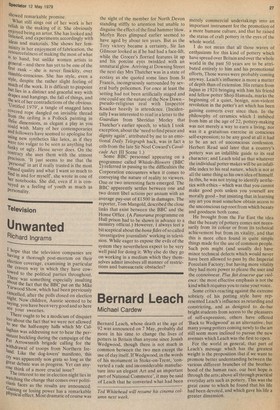Unwanted
Richard lngrams
I hope that the television companies are having a thorough post-mortem on their election coverage, examining in particular the craven way in which they have cowtowed to the political parties throughout. There was something especially insulting about the fact that the BBC put on the Mike .Yarwood Show, which had been previously cancelled, after the polls closed on election night. Now children, Auntie seemed to be saying, you have been very good and so here are your sweeties.
There ought to be a modicum of disquiet too about the fact that we were not allowed to see the half-empty halls which Mr Callaghan was addressing nor to hear the persistant heckling during the campaign of the Pat Arrowsmith brigade calling for the Withdrawal of troops from Northern Ireland. Like the dog-lovers' manifesto, this crY was apparently non grata so long as the great debate was in progress. Yet can any°He think of a more crucial issue? The interest to me in election night lies in watching the change that comes over politicians faces as• the results are announced. Gaining or losing power has a remarkable Physical effect. Most dramatic of course was the sight of the member for North Devon standing stiffly to attention but unable to disguise the effect of the final hammer blow. Merlyn Rees glimpsed earlier seemed to have aged by about ten years. But as the Tory victory became a certainty, Sir Ian Gilmour looked as if he had had a face-lift, while the Grocer's florried features lit up and his porcine eyes twinkled with an unnatural glow. Arriving at Downing Street the next day Mrs Thatcher was in a state of ecstasy as she quoted some lines from Si Francis, incongruously surrounded by several burly policemen. For once at least the 'setting had not been artificially staged and one could see the nature of the New Dawn — pseudo-religious zeal with Inspector Knacker heavily in attendence. (Incidentally I was interested to read in a letter to the Guardian from Sheridan Morley that Thatcher's earlier speech, to which I took exception, about the 'need to find peace and dignity again', attributed by me to an emotional Daily Telegraph hack, was in fact a crib from the late Sir Noel Coward's Cavalcade Act III Scene 1.) Some BBC personnel appearing on a programme called Whistle-Blowers (BBC 2) referred in passing to the difficulties the Corporation encounters when it comes to conveying the nature of reality to viewers. One or two interesting facts emerged. The BBC apparently settles between one and two dozen libel actions per annum with an average pay-out of £1500 in damages. The reporter, Tom Mangold, described the close links that exist between the BBC and the Home Office. (A Panorama programme on Hull prison had to be shown in advance to a ministry official.) However, I always feel a bit sceptical about the bona fides of so called 'investigative journalists' working in television. While eager to expose the evils of the system they nevertheless expect to be very well paid for doing it. Why else do they go on working in a medium which they themselves admit involves all manner of restrictions and bureaucratic obstacles?


































 Previous page
Previous page